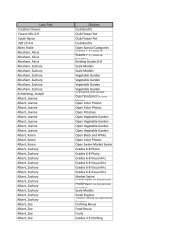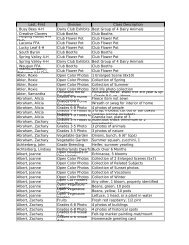FOND DU LAC COUNTY FAIR
FOND DU LAC COUNTY FAIR
FOND DU LAC COUNTY FAIR
Create successful ePaper yourself
Turn your PDF publications into a flip-book with our unique Google optimized e-Paper software.
last test date appear on the certificate of veterinary<br />
inspection.<br />
All cattle originating from Modified Accredited<br />
Advanced states shall have a negative tuberculosis<br />
test within 60 days of import. Call the Division of<br />
Animal Health for a current listing of these states.<br />
Cattle imported from states not recognizing<br />
Wisconsin’s Tuberculosis Free status shall be<br />
required to have a negative tuberculosis test for cattle<br />
within 60 days of import. Call the Division of Animal<br />
Health for a list of these states or review the<br />
department’s web site at www.datcp.state.wi.us,<br />
Animal Welfare & Disease, Importing Animals into<br />
Wisconsin.<br />
Cattle originating from Tuberculosis Accredited<br />
Free herds (except Michigan and Minnesota) may<br />
enter without a prior tuberculosis test if the accredited<br />
herd number appears on the certificate.<br />
Cattle originating from Modified Accredited states<br />
(Michigan and Minnesota) must have a permit<br />
number, a certificate of veterinary inspection which<br />
includes a statement that the cattle will be returning to<br />
the state of origin directly after the show, and<br />
documentation of the special tuberculosis testing:<br />
Each animal attending a fair must have a negative<br />
individual TB test within 60 days of the date of import,<br />
and the herd the animal comes from must have a<br />
negative whole-herd TB test (for animals one year<br />
and older) within 12 months of the date of import.<br />
Exhibitors should contact the Division of Animal<br />
Health at 608-224-4874, well in advance of the fair or<br />
exhibition, to determine any changes in the testing<br />
requirements. Animals for exhibition from Modified<br />
Accredited states are required to return directly to the<br />
state origin after exhibition.<br />
Cattle from Canada may be exhibited in Wisconsin<br />
if they meet current federal requirements to cross the<br />
international border.<br />
Swine<br />
Swine originating from within Wisconsin<br />
All swine shall be accompanied by a Wisconsin<br />
intrastate movement certificate stating that the herd of<br />
origin has been inspected on the farm within 30 days<br />
prior to the exhibition and no apparent disease has<br />
been present in the herd for the past 30 days. The<br />
certificate must also include all required test<br />
documentation.<br />
Swine originating from outside Wisconsin<br />
All swine shall be accompanied by a certificate of<br />
veterinary inspection stating that no pseudorabies<br />
vaccine has been administered to the swine, and<br />
contain all required test documentation.<br />
All swine shall have a negative pseudorabies test<br />
within 30 days of arrival at the fair or originate from a<br />
qualified-negative pseudorabies herd that is qualified<br />
by testing 7% of the herd each month, or originate<br />
from a commercial swine herd in a state classified as<br />
Stage IV or V. The date of the last monthly test must<br />
be included on the certificate.<br />
Swine entering directly from a Stage II state are<br />
not eligible for show or exhibition.<br />
Sheep<br />
Sheep originating from within Wisconsin<br />
Sexually-intact sheep of any age, and all other<br />
sheep 12 months of age and older, must be identified<br />
with official scrapie ear tags or other official individual<br />
10<br />
identification. Sexually intact sheep exposed to<br />
scrapie will not be allowed to exhibit.<br />
Sheep originating from outside Wisconsin<br />
All sheep shall be accompanied by a certificate of<br />
veterinary inspection. All sheep must be identified<br />
with official scrapie ear tags or other official individual<br />
identification. Sheep exposed to scrapie will not be<br />
allowed to enter Wisconsin.<br />
Goats<br />
Goats originating from within Wisconsin<br />
Sexually-intact goats of any age, and all other<br />
goats 12 months of age and older, must be identified<br />
with official scrapie ear tags or other official individual<br />
identification. Sexually intact goats exposed to<br />
scrapie will not be allowed to exhibit.<br />
Goats originating from outside Wisconsin<br />
All goats shall be accompanied by a certificate of<br />
veterinary inspection. All goats must be identified<br />
with official scrapie ear tags or other official individual<br />
identification. Goats exposed to scrapie will not be<br />
allowed to enter Wisconsin.<br />
Goats originating from Modified Accredited states<br />
(Michigan and Minnesota) must have a permit<br />
number, a certificate of veterinary inspection which<br />
includes a statement that the goats will be returning to<br />
the state of origin directly after the show, and<br />
documentation of the special tuberculosis testing:<br />
Each animal attending a fair must have a negative<br />
individual TB test within 60 days of the date of import,<br />
and the herd the animal comes from must have a<br />
negative whole-herd TB test (for animals one year<br />
and older) within 12 months of the date of import.<br />
Exhibitors should contact the Division of Animal<br />
Health at 608-224-4874, well in advance of the fair or<br />
exhibition, to determine any changes in the testing<br />
requirements. Animals for exhibition from Modified<br />
Accredited states are required to return directly to the<br />
state origin after exhibition.<br />
Equine<br />
Equine animals originating from within Wisconsin<br />
All equine animals shall be accompanied by<br />
documentation of a negative EIA test conducted<br />
within the current calendar year and which clearly<br />
identifies the equine by registration number, lip tattoos<br />
or freeze brand, or a complete description of the<br />
equine. Documentation must either be an original<br />
laboratory report VS 10-11 or a certificate of<br />
veterinary inspection with the negative EIA results<br />
listed.<br />
Equine animals originating from outside<br />
Wisconsin<br />
All equine animals shall be accompanied by a<br />
certificate of veterinary inspection (CVI) and have<br />
been tested negative for equine infectious anemia<br />
(EIA) within the current calendar year. The certificate<br />
must clearly identify the equine by a registration<br />
number, lip tattoo or freeze brand, or a complete<br />
description of the equine animal. Equines from<br />
Minnesota are exempt from the CVI requirement if all<br />
of the following apply: 1) Ownership does not change<br />
while the animal is in this state; 2) the animal remains<br />
in this state for no more than 7 days; and 3) the<br />
animal is accompanied by a report of a negative<br />
equine infectious anemia test from the current<br />
calendar year.




